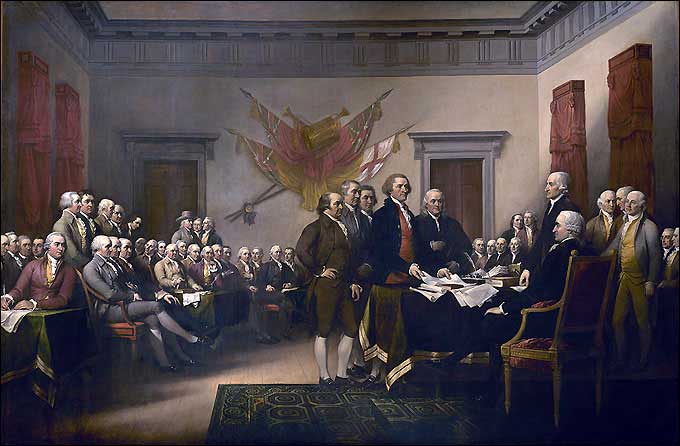
John Trumbull's painting of the drafting committee presenting its work to Congress
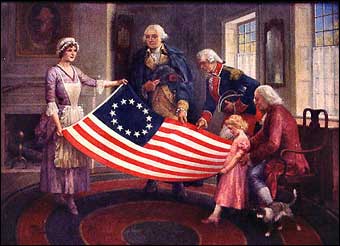
The Second Day of July 1776, will be the most memorable Epocha, in the History of America. I am apt to believe that it will be celebrated, by succeeding Generations, as the great anniversary Festival. It ought to be commemorated, as the Day of Deliverance by solemn Acts of Devotion to God Almighty. It ought to be solemnized with Pomp and Parade, with Shews, Games, Sports, Guns, Bells, Bonfires and Illuminations from one End of this Continent to the other from this Time forward forever more. You will think me transported with Enthusiasm but I am not. I am well aware of the Toil and Blood and Treasure, that it will cost Us to maintain this Declaration, and support and defend these States. Yet through all the Gloom I can see the Rays of ravishing Light and Glory. I can see that the End is more than worth all the Means. And that Posterity will tryumph in that Days Transaction, even altho We should rue it, which I trust in God We shall not. (The Book of Abigail and John: Selected Letters of the Adams Family, 1762-1784, Harvard University Press, 1975, 142).
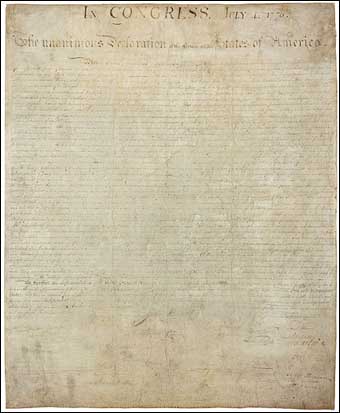
Signed copy of the Declaration of Independence on display at the National Archives in Washington DC
The nations oldest continuous Independence Day celebration belongs to Bristol, Rhode Island when in 1785 Reverend Henry Wight of the First Congregational Church organized the Bristol Fourth of July Committee. The first mention of a parade in Bristol celebration took place on July 4, 1777 when a British officer recorded the sounds coming from across the Narragansett Bay:
"This being the first anniversary of the Declaration of Independence of the Rebel Colonies, they ushered in the morning by firing 13 cannons, one for each colony, we suppose. At sunset, the rebel frigates fired another round of 13 guns, each one after the other. As the evening was very still and fine the echo of the guns down the Bay had a grand effect."

State House now known as Independence Hall, Philadelphia
One year later on July 2, 1777, a person in Philadelphia thought it would be appropriate to celebrate the first anniversary of independence. Even with the country at war, arrangements were made for an official dinner. John Adams wrote a letter to his daughter setting the tone of the first anniversary of the 4th of July celebration:
Philadelphia, July 5th, 1777
My dear Daughter,
Yesterday, being the anniversary of American Independence, was celebrated here with a festivity and ceremony becoming the occasion. I am too old to delight in pretty descriptions, if I had a talent for them, otherwise a picture might be drawn, which would please the fancy of a Whig, at least. The thought of taking any notice of this day, was not conceived, until the second of this month, and it was not mentioned until the third. It was too late to have a sermon, as every one wished, so this must be deferred another year. Congress determined to adjourn over that day, and to dine together. The general officers and others in town were invited, after the President and Council, and Board of War of this State. In the morning the Delaware frigate, several large gallies, and other continental armed vessels, the Pennsylvania ship and row gallies and guard boats, were all hawled off in the river, and several of them beautifully dressed in the colours of all nations, displayed about upon the masts, yards, and rigging. At one o’clock the ships were all manned, that is, the men were all ordered aloft, and arranged upon the tops, yards, and shrowds, making a striking appearance-of companies of men drawn up in order, in the air. Then I went on board the Delaware, with the President and several gentlemen of the Marine Committee, soon after which we were saluted with a discharge of thirteen guns, which was followed by thirteen others, from each other armed vessel in the river; then the gallies followed the fire, and after them the guard boats. Then the President and company returned in the barge to the shore, and were saluted with three cheers, from every ship, galley, and boat in the river. The wharves and shores, were lined with a vast concourse of people, all shouting and huzzaing, in a manner which gave great joy to every friend to this country, and the utmost terror and dismay to every lurking tory. At three we went to dinner, and were very agreeably entertained with excellent company, good cheer, fine music from the band of Hessians taken at Trenton, and continual vollies between every toast, from a company of soldiers drawn up in Second-street before the city tavern, where we dined. The toasts were in honour of our country, and the heroes who have fallen in their pious efforts to defend her. After this, two troops of light-horse, raised in Maryland, accidentally here in their way to camp, were paraded through Second-street, after them a train of artillery, and then about a thousand infantry, now in this city on their march to camp, from North Carolina. All these marched into the common, where they went through their firings and manoeuvres; but I did not follow them. In the evening, I was walking about the streets for a little fresh air and exercise, and was surprised to find the whole city lighting up their candles at the windows. I walked most of the evening, and I think it was the most splendid illumination I ever saw; a few surly houses were dark; but the lights were very universal. Considering the lateness of the design and the suddenness of the execution, I was amazed at the universal joy and alacrity that was discovered, and at the brilliancy and splendour of every part of this joyful exhibition. I had forgot the ringing of bells all day and evening, and the bonfires in the streets, and the fireworks played off. Had General Howe been here in disguise, or his master, this show would have given them the heart-ache.
I am your affectionate father,
John Adams
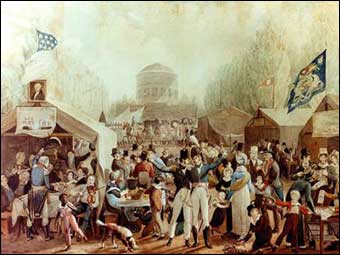
Yesterday the 4th of July, being the Anniversary of the Independence of the United States of America, was celebrated in this city with demonstration of joy and festivity. About noon all the armed ships and gallies in the river were drawn up before the city, dressed in the gayest manner, with the colours of the United States and streamers displayed. At one o'clock, the yards being properly manned, they began the celebration of the day by a discharge of thirteen cannon from each of the ships, and one from each of the thirteen gallies, in honour of the Thirteen United States. In the afternoon an elegant dinner was prepared for Congress, to which were invited the President and Supreme Executive Council, and Speaker of the Assembly of this State, the General Officers and Colonels of the army, and strangers of eminence, and the members of the several Continental Boards in town. The Hessian band of music taken in Trenton the 26th of December last, attended and heightened the festivity with some fine performances suited to the joyous occasion, while a corps of British deserters, taken into the service of the continent by the State of Georgia, being drawn up before the door, filled up the intervals with feux de joie. After dinner a number of toasts were drank, all breaking independence, and a generous love of liberty, and commemorating the memories of those brave and worthy patriots who gallantly exposed their lives, and fell gloriously in defence [sic] of freedom and the righteous cause of their country. Each toasts was followed by a discharge of artillery and small arms, and a suitable piece of music by the Hessian band. The glorious fourth of July was reiterated three times accompanied with triple discharges of cannon and small arms, and loud huzzas that resounded from street to street through the city. Towards evening several troops of horse, a corps of artillery, and a brigade of North Carolina forces, which was in town on its way to join the grand army, were drawn up in Second street and reviewed by Congress and the General Officers. The evening was closed with the ringing of bells, and at night there was a grand exhibition of fireworks, which began and concluded with thirteen rockets on the commons, and the city was beautifully illuminated. Every thing was conducted with the greatest order and decorum, and the face of joy and gladness was universal. Thus may the 4th of July, that glorious and ever memorable day, be celebrated through America, by the sons of freedom, from age to age till time shall be no more. Amen, and amen (Virginia Gazette, 18 July 1777).
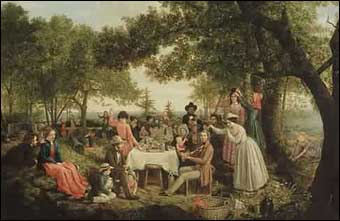
A Pic Nick, Camden Maine painted by Jerome Thompson, 1850
"In the evening Col. Crafts illuminated his park on the commons, threw several shells, and exhibited a number of fireworks.” Boston had another display in 1779 when thirteen rockets were fired."
The customs and celebrations in observance of the 4th of July spread to small and large towns. Worcester, Massachusetts began to set off fireworks in 1779:
“In the evening the Court House will be illuminated and there will be an exhibition of fireworks.” By 1783, fireworks were available for sale to the public in Philadelphia. Jean Leaguay, a local merchant advertised “a large and curious assortment of fireworks.” In 1784, Mr. Laugby was advertising various kinds of fireworks to the public, including "rockets, serpents, wheels, table rockets, cherry trees, fountains, and sun flowers."

Captain Frederick Marryat was an English Royal Navy Officer who visited America in 1837. He was a novelist and acquaintance with Charles Dickens. He recorded the 61st anniversary of American Independence in New York in specific detail:
The 4th of July, the sixty-first anniversary of American independence!
Pop--pop--bang--pop--pop--bang--bang--bang! Mercy on us! how fortunate it is that anniversaries come only once a year. Well, the Americans may have great reason to be proud of this day, and of the deeds of their forefathers, but why do they get so confoundedly drunk? why, on this day of independence, should they become so_dependent_ upon posts and rails for support? The day is at last over: my head aches, but there will be many more aching heads tomorrow morning!
What a combination of vowels and consonants have been put together! what strings of tropes, metaphors, and allegories, have been used on this day! what varieties and gradations of eloquence! There are at least fifty thousand cities, towns, villages, and hamlets, spread over the surface of America--in each the Declaration of Independence has been read: in all one, and some two or three, orations have been delivered, with as much gunpowder in them as in the squibs and crackers. But let me describe what I actually saw.
The commemoration commenced, if the day did not, on the evening of the 3rd, by the municipal police going round and pasting up placards, informing the citizens of New York, that all persons letting off fireworks would be taken into custody, which notice was immediately followed up by the little boys providing their independence of the authorities, by letting off squibs, crackers, and bombs; and cannons, made out of shin bones, which flew in the face of every passenger, in the exact ration that the little boys flew in the face of the authorities. This continued the whole night, and thus was ushered in the great and glorious day, illumined by a bright and glaring sun (as if bespoken on purpose by the mayor and corporation), with the thermometer at 90 degrees in the shade. The first sight which met the eye after sunrise, was the precipitate escape, from a city visited with the plague of gunpowder, of respectable or timorous people in coaches, carriages, waggons, and every variety of vehicle. "My kingdom for a horse!" was the general cry of all those who could not stand fire. In the mean while, the whole atmosphere was filled with independence. Such was the quantity of American flags which were hoisted on board of the vessels, hung out of windows, or carried about by little boys, that you saw more stars at noon-day than ever could be counted on the brightest night. On each side of the whole length of Broadway, were ranged booths and stands, similar to those at an English fair, and on which were displayed small plates of oysters, with a fork stuck in the board opposite to each plate; clams sweltering in the hot sun; pineapples, boiled hams, pies, puddings, barley-sugar, and many other indescribables. But what was most remarkable, Broadway being three miles long, and the booths lining each side of it, in every booth there was a roast pig, large or small, as the centre attraction. Six miles of roast pig! and that in New York city alone; and roast pig in every other city, town, hamlet, and village in the Union. What association can there be between roast pig and independence? Let it not be supposed that there was any deficiency in the very necessary articks of potation on this auspicious day: no! the booths were loaded with porter, ale, cyder, mead, brandy, wine, ginger-beer, pop, soda-water, whiskey, rum, punch, gin slings, cocktails, mint julips, besides many other compounds, to name which nothing but the luxuriance of American-English could invent a word. Certainly the preparations in the refreshment way were most imposing, and gave you some idea of what had to be gone through on this auspicious day. Martial music sounded from a dozen quarters at once; and as you turned your head, you tacked to the first bars of a march from one band, the concluding bars of Yankee Doodle from another. At last the troops of militia and volunteers, who had been gathering in the park and other squares, made their appearance, well dressed and well equipped, and in honour of the day, marching as independently as they well could. I did not see them go through many manoeuvres, but there was one which they appeared to excel in, and that was grounding arms and eating pies. I found that the current went towards Castle Garden, and away I went with it. There the troops were all collected on the green, shaded by the trees, and the effect was very beautiful. The artillery and infantry were drawn up in a line pointing to the water. The officers in their regimental dresses and long white feathers, generals and aides-de-camp, colonels, commandants, majors, all galloping up and down in front of the line,--white horses and long tails appearing the most fashionable and correct. The crowds assembled were, as American crowds usually are, quiet and well behaved. I recognised many of my literary friends turned into generals, and flourishing their swords instead of their pens, the scene was very animating; the shipping at the wharfs were loaded with star-spangled banners; steamers paddling in every direction, were covered with flags; the whole beautiful Sound was alive with boats and sailing vessels, all flaunting with pennants and streamers. It was, as Ducrow would call it, "A Grand Military and Aquatic Spectacle."
Then the troops marched up into town again, and so did I follow them as I used to do the reviews in England, when a boy. All creation appeared to be independent on this day; some of the horses particularly so, for they would not keep 'in no line not no how.' Some preferred going sideways like crabs, others went backwards, some would not go at all, others went a great deal too fast, and not a few parted company with their riders, whom they kicked off just to shew their independence; but let them go which way they would, they could not avoid the squibs and crackers. And the women were in the same predicament: they might dance right, or dance left, it was only out of the frying-pan into the fire, for it was pop, pop; bang, bang; fiz, pop, bang, so that you literally trod upon gunpowder.
When the troops marched up Broadway, louder even than the music were to be heard the screams of delight from the children at the crowded windows on each side. "Ma! ma! there's pa!" "Oh! there's John." "Look at uncle on his big horse."
The troops did not march in very good order, because, independently of their knowing how, there was a great deal of independence to contend with. At one time an omnibus and four would drive in and cut off the general and his staff from his division; at another, a cart would roll in and insist upon following close upon the band of music; so that it was a mixed procession--Generals, omnibus and four, music, cart-loads of bricks, troops, omnibus and pair, artillery, hackney-coach, etcetera. etcetera. Notwithstanding all this, they at last arrived at the City Hall, when those who were old enough heard the Declaration of Independence read for the sixty-first time; and then it was--"Begone, brave army, and don't dick up a row."
I was invited to dine with the mayor and corporation at the City Hall. We sat down in the Hall of Justice, and certainly, great justices was done to the dinner, which (as the wife says to her husband after a party, where the second course follows the first with unusual celerity) "went off remarkably well." The crackers popped outside, and the champagne popped in. The celerity of the Americans at a public dinner is very commendable; they speak only now and then; and the toasts follow so fast, that you have just time to empty your glass, before you are requested to fill again. Thus the arranged toasts went off rapidly, and after them, any one might withdraw. I waited till the thirteenth toast, the last on the paper, to wit, the ladies of America; and, having previously, in a speech from the recorder, bolted Bunker's Hill and New Orleans, I thought I might as well bolt myself, as I wished to see the fireworks, which were to be very splendid.
Unless you are an amateur, there is no occasion to go to the various places of public amusement where the fireworks are let off, for they are sent up every where in such quantities that you hardly know which way to turn your eyes. It is, however, advisable to go into some place of safety, for the little boys and the big boys have all got their supply of rockets, which they fire off in the streets--some running horizontally up the pavement, and sticking into the back of a passenger; and others mounting slantingdicularly and Paul-Prying into the bed-room windows on the third floor or attics, just to see how things are going on _there_. Look in any point of the compass, and you will see a shower of rockets in the sky; turn from New York to Jersey City, from Jersey City to Brooklyn, and shower is answered by shower on either side of the water. Hoboken repeats the signal: and thus it is carried on to the east, the west, the north, and the south, from Rhode island to the Missouri, from the Canada frontier to the Gulf of Mexico. At the various gardens the combinations were very beautiful, and exceeded anything that I had witnessed in London or Paris, What the sea-serpents, giant rockets scaling heaven, Bengal lights, Chinese fires, Italian suns, fairy bowers, crowns of Jupiter, exeranthemums, Tartar temples, Vesta's diadems, magic circles, morning glories, stars of Columbia, and temples of liberty, all America was in a blaze; and in addition to this mode of manifesting its joy, all Americans tipsy.
There is something grand in the idea of a national intoxication. In this world, vices on a grand scaled dilate into virtues, he who murders one man, is strung up with ignominy; but he who murders twenty thousand has a statue to his memory, and is handed down to posterity as a hero. A staggering individual is a laughable and, sometimes, a disgusting spectacle; but he whole of a vast continent reeling, offering a holocaust of its brains for mercies vouchsafed, is an appropriate tribute of gratitude from the rights of equally and the _levelling spirit_ of their institutions.
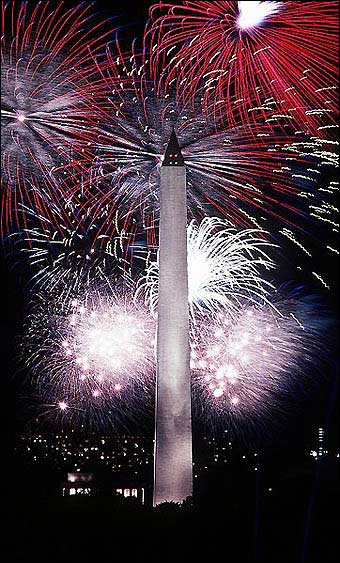
Fireworks surrounding the Washington Monument
Let the poets of Europe write odes on their king
Or their musical notes raise so high,
The birth-day of freedom we ever will sing
And rejoice on the Fourth of July.
No proud, haughty monarch can here bear the sway
Since tyranny now we defy;
Fair liberty ushers this joyful glad day,
And proclaims ’tis the Fourth of July.
May Columbians united, preserve and protect
The blessings on which they rely,
Nor with shameful indifference ever neglect
To remember the Fourth of July.
This day be it sacred to freedom and peace,
Festivity, friendship and joy;
May our land in prosperity ever encrease
And be bles’d on the Fourth of July.
July, 1790. S.W.Z.
Source: Research and Text by Bryan Wright



